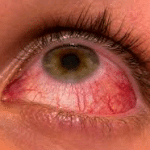By Steven Reinberg

WEDNESDAY, Sept. 7, 2016 (HealthDay News)
People with chronic eye inflammation known as uveitis may be able to keep the condition at bay with the immune-suppressing drug Humira (adalimumab), a new study finds.
“Humira doesn’t cure uveitis, but it does cause it to become quiet,” said lead researcher Dr. Glenn Jaffe. He’s a professor of ophthalmology at Duke University School of Medicine in Durham, N.C., and a consultant for Humira’s maker, AbbVie.
“The hope is while the disease is in a quiet state, the disease activity just burns itself out — but it can also come back,” he said.
The U.S. Food and Drug Administration approved Humira for the treatment of uveitis in June.
Uveitis is a term used to describe a group of inflammatory diseases inside the eye, it can cause loss of vision and potentially lead to blindness. The condition may also be painful.
The current standard treatment for uveitis is corticosteroids. But this treatment comes with a significant risk of side effects, the researchers said. Side effects may include weight gain, mood changes, fatigue, acne and more.
Humira reduces inflammation by blocking proteins that cause inflammation.
One concern with Humira is an increased chance of infections. For this reason, doctors need to be sure patients don’t have tuberculosis or multiple sclerosis before taking the drug.
When the inflammation is quiet, patients are usually treated for about two years. “If the eye is quiet over that time, we will consider to start tapering the treatment to see is the disease has burned itself out,” said Dr. Glenn Jaffe.
“This is the first time that we have an FDA-approved drug other than steroids to treat uveitis,” he stated.
For phase 3 trial, 200 patients with uveitis were assigned randomly to Humira or an inactive placebo. Patients given the drug received an initial dose of 80 milligrams followed by 40 milligrams every two weeks.
Patients were also given an initial dose of the steroid prednisone, which was decreased over 15 weeks.
The researchers found that people receiving Humira were less likely to experience flare-ups of uveitis than those on placebo.
The investigators found, among those taking Humira, the average time to a flare-up with the condition was 24 weeks, compared with 13 weeks for those taking the placebo.
During the study, researchers looked for signs of returning inflammation.
“Humira decreased the percentage of people by about half who had a flare-up of inflammation,” Jaffe said.
In addition, those taking Humira had significantly fewer vision problems than those taking placebo, the study authors reported.
According to Dr. Mark Fromer, an ophthalmologist at Lenox Hill Hospital in New York City, “Humira effectively achieved disease control after stopping steroid treatment.” Dr. Fromer was not involved with the study but was familiar with the findings.
“Further investigation into alternative therapies for uveitis disease is necessary to attempt to save the sight of the many patients that suffer from this sight-threatening group of diseases,” Dr. Fromer said.


